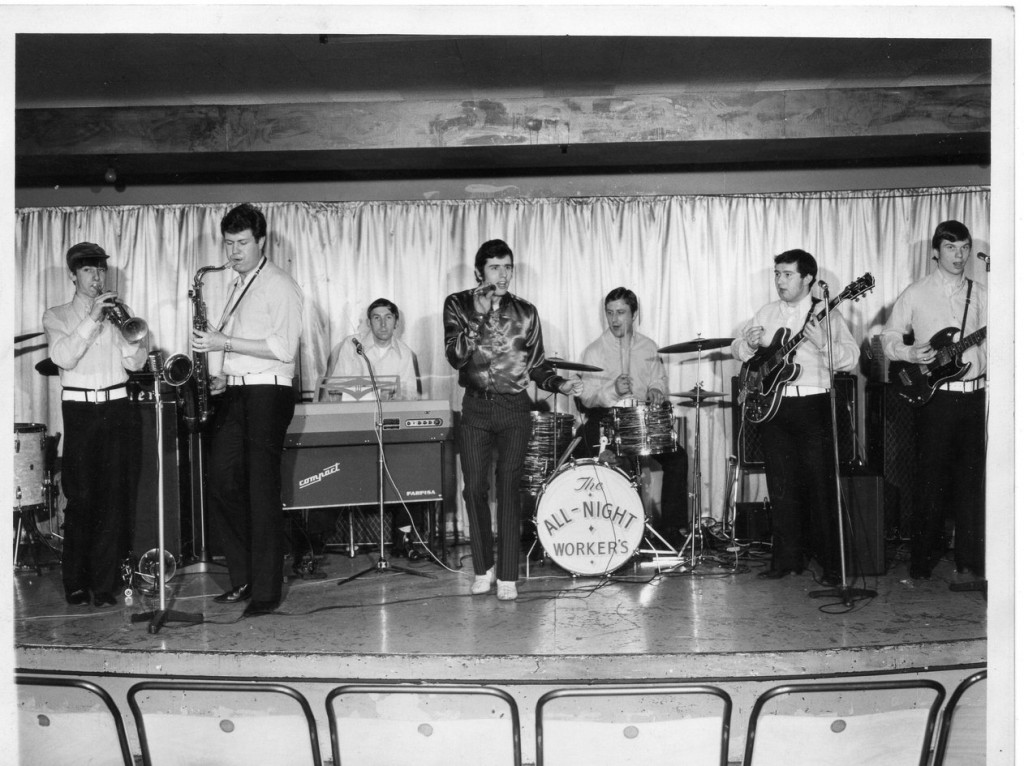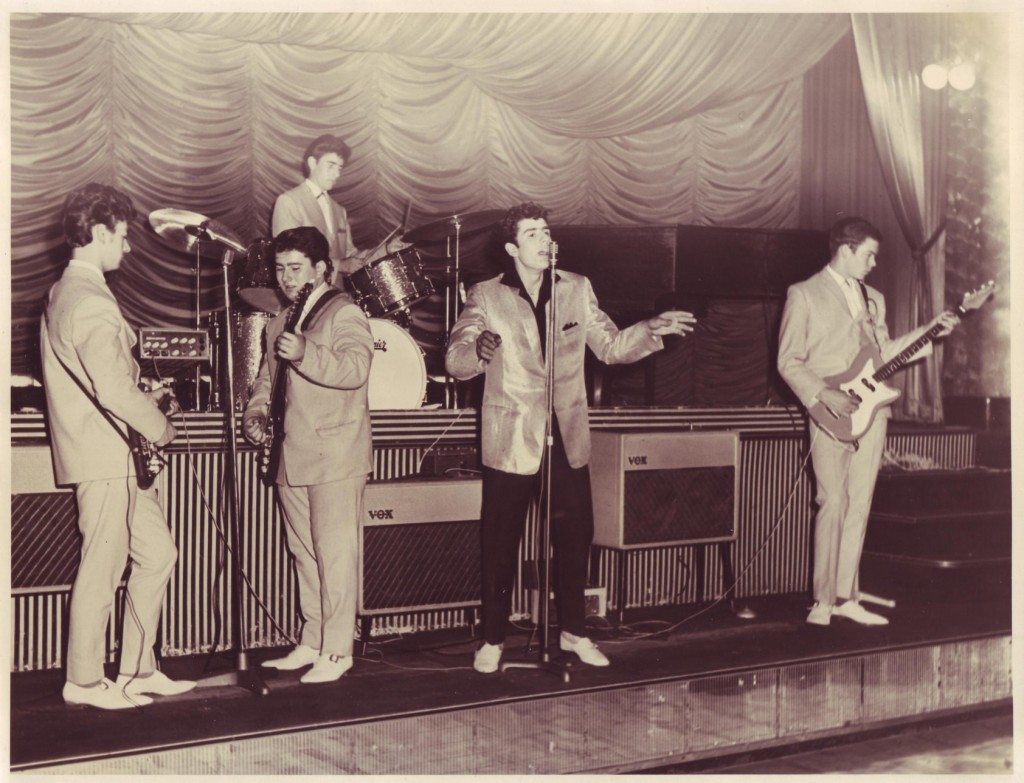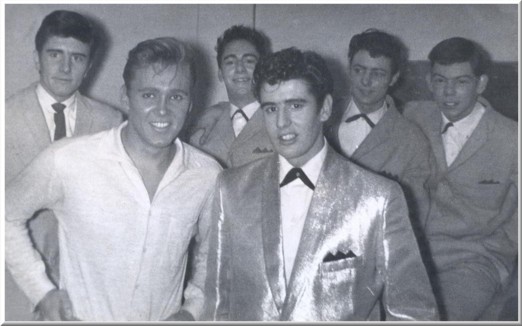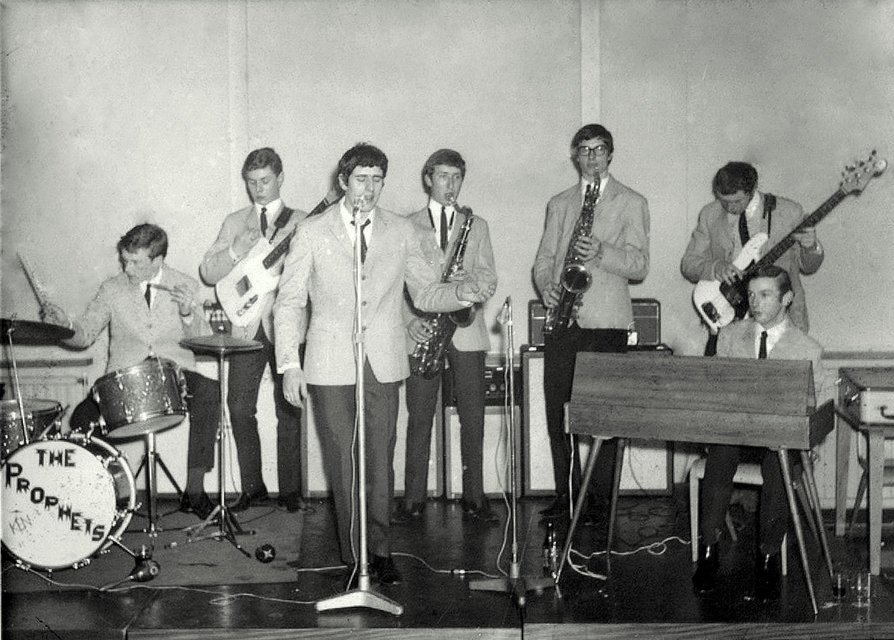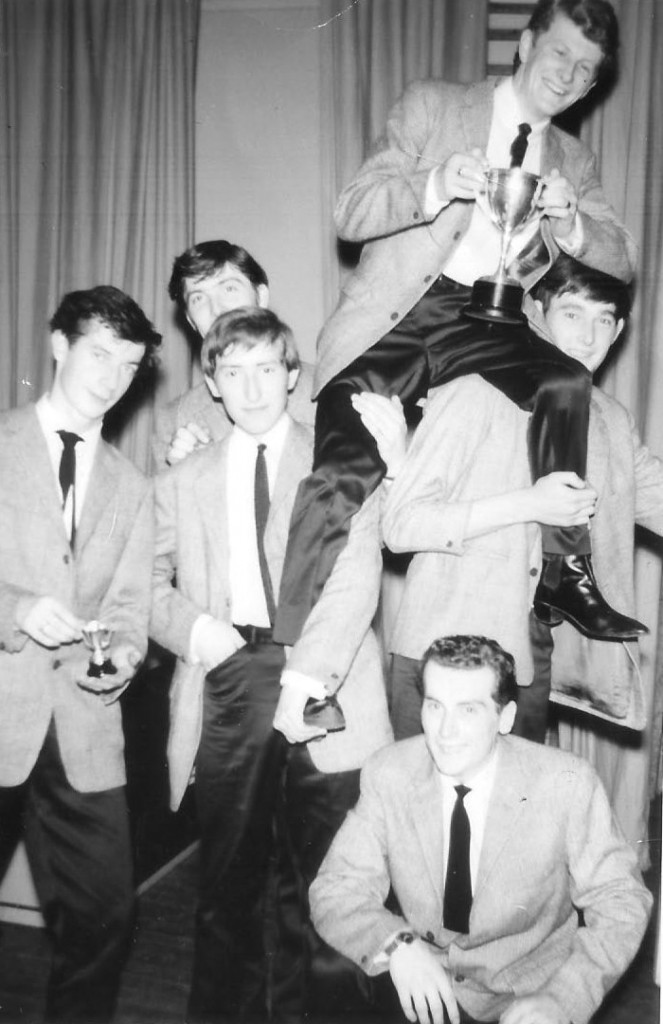By Nick Warburton
Not to be confused with the 1960s US R&B band that recorded a pair of singles for the Round Sound and Cameo labels (the first co-written by a pre-Velvet Underground Lou Reed and John Cale) nor the 1960s Liverpool beat group of the same name, The All Night Workers/The All Nite Workers was a name used by a bunch of West London musicians for a series of interrelated bands that spanned the years 1965-1972.
Considering that around 30 musicians passed through the different versions of The All Night Workers/The All Nite Workers, the band’s history is almost impossible to pin down with complete accuracy, so the Strange Brew would welcome any further information to fill in the gaps.
The All Night Workers at Starlite, Greenford, 1966. Left to right: Ronny Butterworth, Kenny Power, Dave Holloway, Mick Wheeler, Hans Herbert, Brian Sell and Doug Ayris (photo from Mick Wheeler)
In the first part of an exhaustive history, Nick Warburton tells the story of one of West London’s long forgotten bands.
The All Night Workers/All Nite Workers really begins with singer Mick Wheeler, who attended Kneller School in Twickenham, Middlesex during the mid-late 1950s. It was there that he met several musicians that would feature prominently in the band’s history in later years.
One of these was lead guitarist Brian Sell, who happened to be in the year below Wheeler. Around 1957, while in their teens, the pair played skiffle together, which laid the foundations for several future collaborations.
Also in Sell’s year at Kneller School were rhythm guitarist Brian Mansell, who would also feature prominently in the band’s story, and drummer Terry Mabey. When Kneller shut, all of the friends went to Whitton Secondary in nearby Whitton, Middlesex.
Around 1959, however, all of the musicians started to get involved with local bands. While Mick Wheeler (who used the stage name Mike Dee) joined Twickenham band The Paragons as a rhythm guitarist (alongside singer Jeff Rolfe, lead guitarist Jimmy Johnson and drummer John Seddon), Brian Sell, Brian Mansell and Terry Mabey formed The Jaywalkers with future New Animals’ guitarist Vic Briggs. Brian Sell came up with the band name after seeing a sign for jaywalking while on the bus in Twickenham.
The original line up debuted at Zeeta’s in Putney but soon after Briggs left and the band took on lead singer Denny De Banks, who was two years older than the rest of the group. Around this time, The Jaywalkers also took on bass player Dave Tippler, a friend of Briggs’ from Feltham, Middlesex.
On 4 February 1961, The Jaywalkers came second at the Borough of Twickenham Rhythm Group contest, held at St Mary’s Hall, Twickenham. However, well-known DJ Phil Jay, one of the judges on the panel, was impressed and offered to be their manager.
When Denny De Banks, who had a well-paid job and could not commit to going professional, announced he was leaving, Brian Mansell ran into Mick Wheeler and offered him the lead vocal spot, which he accepted.
Mike Dee & The Jaywalkers (February 1961-April 1962), The Condors (April-May 1962)
- Mick Wheeler (aka Mike Dee) – lead vocals
- Brian Sell – lead guitar (replaced by Ritchie Blackmore in May 1961)
- Brian Mansell – rhythm guitar
- Dave Tippler –bass
- Terry Mabey – drums
The original Mike Dee & The Jaywalkers line up was short-lived. Having passed an audition at the Carlton Ballroom in Slough, Berkshire and played there regularly, the musicians decided to dispense with Brian Sell around May 1961 and replaced him with an amazing guitarist who was beginning to turn heads on the local music scene – future Deep Purple axe man Ritchie Blackmore.
The original Mike Dee & The Jaywalkers, 1961. Left to right: Brian Mansell, Brian Sell, Terry Mabey, Mick Wheeler and Dave Tippler (photo from Brian Mansell)
Tragically, it was Brian Sell who introduced his replacement to the band. Sell had originally met Ritchie Blackmore at Dawe Instruments electronics factory in Brentford around 1958/1959 where the latter worked as a trainee electronic wireman. The pair had briefly rehearsed together in a trio with drummer Mick Underwood before Sell formed The Jaywalkers and Blackmore and (later) Underwood joined Bobbie & The Dominators.
According to Jerry Bloom in his excellent book “Ritchie Blackmore – Black Knight”, Phil Jay wanted the band to sign with the George Cooper Agency. The band’s manager compered a lot of the Larry Parnes tours and many of the artists that appeared were booked through the agency, which wanted to sign The Jaywalkers up but not with Sell as the guitarist. As a result, Blackmore was drafted in as a replacement for Sell, who went on to join Rey Anton & The Peppermint Men (see later entry).
During Blackmore’s tenure with the band, Derek Sirmon, another former Kneller pupil, subbed for Terry Mabey on several occasions when he wasn’t well enough to perform.
Bloom’s Ritchie Blackmore book also notes that the second Mike Dee & Jaywalkers’ line up got the opportunity to record two tracks for Decca Records for a proposed single – “Stolen Hours” c/w “My Blue Heaven” at the label’s West Hampstead studios but they were subsequently shelved. Brian Mansell’s diary notes that the band recorded in the morning on 27 September 1961 before playing a show at the Carlton Ballroom in Slough that evening.
In mid-November Phil Jay got Mike Dee & The Jaywalkers on to a package tour headlined by Billy Fury and also including Eden Kane, Karl Denver and Shirley Douglas. When Douglas fell ill, Mike Dee & The Jaywalkers got the opportunity to fill in until she got better.
Mick Wheeler (Mike Dee) and the Jaywalkers with Billy Fury. Behind – the rest of the Jaywalkers left to right; Terry Mabey (drums), Brian Mansell (rhythm), Ritchie Blackmore (lead) and Dave Tippler (bass)
However, there was some confusion because Peter Jay & The Jaywalkers, who were backing Eden Kane, were also on the tour. Mike Dee & The Jaywalkers’ involvement was cut short after playing two gigs – the first at the Granada in Dartford on 20 November and the second at the Guild Hall in Portsmouth on 21 November (where a photo was taken of the band with Billy Fury), when Douglas returned to the bill.
In early 1962, the band dispensed with Phil Jay and signed with the Rudy Stanton Agency. However, while playing at Southall Community Centre in early April 1962, Screaming Lord Sutch dropped in and offered Blackmore more money to play with his backing band The Savages. Blackmore jumped at the chance but with a short tour lined up, he asked his friend Dave Wendels to fill in until he could join in May.
A package tour headlined by Gary U.S. Bonds, Johnny Burnette and Gene McDaniel had been booked for April-May 1962. Johnny Milton & The Condors were also lined up to appear, with The Condors backing support acts, Rolly Daniels, Danny Rivers and Mark Wynter. However, with all the publicity already made up, Johnny Milton & The Condors split up.
With the confusion over the two Jaywalkers, Mike Dee & The Jaywalkers were asked to change name to The Condors and took their place. Mick Wheeler was not invited to participate so sat out while the others backed the support acts on the 21-date tour. When the tour wound up on 13 May 1962, Ritchie Blackmore departed for Sutch’s band and The Jaywalkers duly fell apart.
Within weeks, Brian Mansell had joined Ealing-band Frankie Reid & The Casuals, which at the time featured future Jimi Hendrix sticks man Mitch Mitchell on the drum stool. After a few months, however, Mansell lobbied for Terry Mabey to take over from Mitchell, which is what he did.
In late September 1962 Brian Mansell quit Frankie Reid’s band and dropped out of the music scene for several years, later joining The Missing Links in February 1966. As for Terry Mabey, he left The Casuals soon after Mansell’s departure and joined James Royal & The Hawks. Both musicians would become involved in The All Night Workers’ history in the mid-1960s but at different times.
Mick Wheeler meanwhile decided that he wanted to leave the music scene for the time being and joined the parachute regiment in the Territorial Army. After completing his training and gaining his wings, Wheeler returned to the live scene in in mid-1964 with Guitars Incorporated and then Mike Dee & The Prophets (see entries below).
Rey Anton & The Peppermint Men (circa late 1963-mid 1965)
- Rey Anton – lead vocals
- Brian Sell – lead guitar/rhythm guitar
- Ted Dry – lead guitar/rhythm guitar
- Martin Dry – bass
- Malcolm “Doc” Randall – drums
Having been kicked out of his own band in May 1961, Brian Sell continued in the music business and joined The Bandits with singers Kerry Rapid, Cal Danger and Mel Turner; lead guitarist Dick Scott; bass player Pete Wilson; and drummer Brian Rocky-Ford.
When the rest of band decided to relocate to Plymouth, Sell opted to stay in London and formed a new version of The Bandits with guitarist Ted Dry, bass player (and brother) Martin Dry and drummer Malcolm “Doc” Randall. The Bandits signed to Bob Potter’s Agency soon after and frequently played at the Agincourt Ballroom in Camberley, Surrey and the Atalanta Ballroom in Woking, Surrey.
During late 1963, however, the musicians joined forces with singer Rey Anton and became Rey Anton & The Peppermint Men. Signing to the Chris Wainwright Agency, they based themselves out of Leek, Staffordshire and gigged nationally.
Around mid-1964, Rey Anton & The Peppermint Men signed to Parlophone Records and recorded three singles together – “You Can’t Judge A Book By The Cover” c/w “It’s Cold Outside” and “Heard It All Before” c/w “I Want You” in 1964, and “Wishbone” c/w “Kingsway” in 1965, before Anton formed a new version of The Peppermint Men in mid-1965.
[tubepress video=yHIK8x7Pgz4]
Sometime after this, Brian Sell reunited with Mick Wheeler and the pair formed the first version of The All Night Workers around mid-1966 (see part 3 in the band history). Drummer Malcolm Randall, meanwhile, ended up joining Hounslow band, The Dae-b-Four around August 1965 and then worked as a freelance drummer before joining up with Brian Mansell in The Missing Links. This latter band would evolve into a second version of The All Night Workers in early October 1967 (see Part 4).
Guitars Incorporated (circa mid-1964)
- Mick Wheeler (aka Mike Dee) – vocals
- Dave Claridge – lead guitar
- Peter Kindel – lead guitar
- Ron Thomas – bass
- Johnny Hickson – drums
After leaving the parachute regiment in the TA, Mick Wheeler joined Guitars Incorporated, an instrumental band based in Southall, Middlesex. Guitars Incorporated had been formed years earlier by bass player Ron Thomas, who’d grown up near the Cuckoo estate in Hanwell, Middlesex, and lead guitarist Peter Kindel; both having met at Brentside Secondary School in Greenford, Middlesex.
With a drummer and second guitarist Dave Claridge, who lived around the Carshalton, Surrey area and also worked for Melody Maker, they recorded some demos at Abbey Road. Around May/June, Wheeler joined as singer and Thomas’s childhood friend, Johnny Hickson came in on drums. Soon after, around August 1964, Wheeler, Claridge and Thomas decided to put together a new band, The Prophets.
Notable gigs:
- 4 July 1964 – Marcam Hall, March, Cambridgeshire with Johnny Mike & The Shades
Mike Dee & The Prophets (Circa August 1964-May 1965)
- Mick Wheeler (aka Mike Dee) – lead vocals
- Dave Claridge – lead guitar
- Ron Thomas – bass
- Don Martin – organ
- Mel Wayne – sax
- Dave Mahoney – sax
- Ken Hope – drums
Mike Dee & The Prophets, early 1964. Left to right: Ken Hope (drums), Dave Claridge (lead), Mike Dee (vocals), Mel Wayne (Sax), Dave Mahoney (sax), Ron Thomas (Bass), Don Martin (organ)
Formed around August 1964, The Prophets included sax player Dave Mahoney, a friend of Ron Thomas’s from Brentside Secondary School in Greenford. Thomas also brought in his childhood friend from Hanwell, Don Martin, who was fooling around on the piano one day at Hanwell Community Centre when he was given the invite to join the fledgling group.
Mel Wayne (aka Melvyn Hoskins) was from the Twickenham area and was brought in by Mick Wheeler after playing with Colin Shane & The Shannons, who also featured Colin Shane (lead vocals); Dave Mumford (lead guitar); Dick Merrit (bass); Dave King (rhythm guitar) and Alan Worrell (drums).
Colin Shane and The Shannons, late 1963. Clockwise from far left: Alan Worrell, Mel Wayne (front), Dave Mumford (behind), Colin Shane (holding the trophy), Dave King (holding Colin Shane) and Dick Merrit (kneeling at the front)
The Prophets rehearsed with another drummer at first before Ken Hope, who was Mick Wheeler’s best man at his wedding on 27 February 1965, came on board after playing in The Tony Meehan Combo.
Mike Dee & The Prophets rehearsed at a community centre in Northfields before hitting the road in September 1964. After a couple of months with a manager called Mac MacQueen, they were spotted by Australian impresario and entertainment entrepreneur Robert Stigwood, who signed them to his agency, the Robert Stigwood Organisation. Dave Claridge left around April 1965 and Ron Thomas invited guitarist Mick Stewart, a friend from the Cuckoo estate in Hanwell, to replace him.
Mick Stewart had previously filled in briefly as a guitarist for Screaming Lord Sutch’s backing band, The Savages. More recently, Stewart had played with Indian-born singer Simon Scott and Stigwood arranged for The Prophets to become Scott’s new support band after he had split from The Leroys. Dispensing with the name The Prophets, they became The All Nite Workers.
Mick Wheeler decided that he’d had enough and left the band, Don Martin has in his diary that Mike Dee & The Prophets broke up on 13 May 1965. However, around mid-1966, he returned to the live scene with a different band called The All Night Workers. Ken Hope, who also bailed out when Mick Stewart recommended his friend Eddie Thorpe, would briefly reunite with Mick Wheeler in this other version.
Notable gigs:
- 20 September 1964 – Bryon, Greenford, Middlesex (Mike Dee Combo)
Part 2 – available here: http://thestrangebrew.co.uk/articles/the-all-night-workers-part-2
Copyright © Nick Warburton, 2012. All Rights Reserved. No part of this article may be reproduced or transmitted in any form or by any means, without prior permission from the author.
To contact the author, email: Warchive@aol.com
Follow Nick on Twitter: @Lucifersblues
Many people helped piece this remarkable family tree together. My personal thanks go to: Mick Wheeler, Brian Mansell, Brian Sell, Ron Thomas, Don Martin, Mel Wayne, Brian Hosking and Malcolm Randall.
